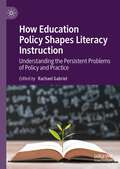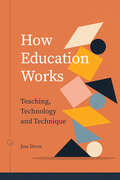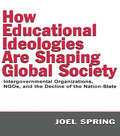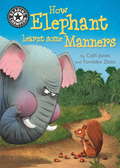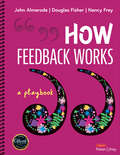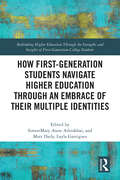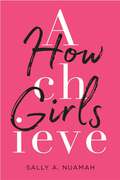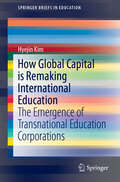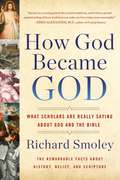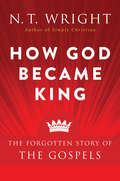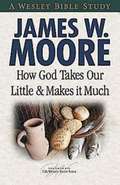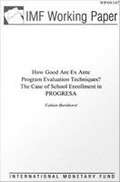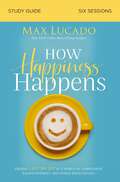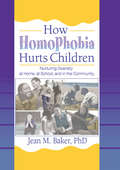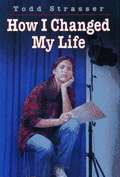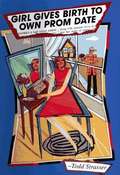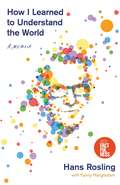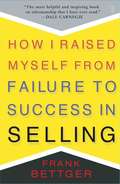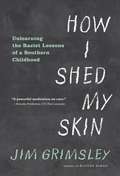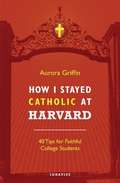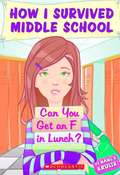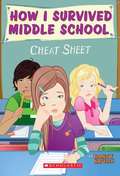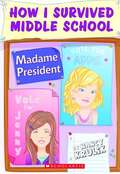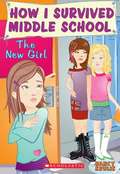- Table View
- List View
How Education Policy Shapes Literacy Instruction: Understanding the Persistent Problems of Policy and Practice
by Rachael GabrielReading instruction is the most legislated area of education and the most frequently referenced metric for measuring educational progress. This book traces the trajectories of policy issues with direct implications for literacy teaching, learning, and research in order to illustrate the dynamic relationships between policy, research, and practice as they relate to perennial issues such as: retention in grade, remediation, intervention, instruction for English learners, early literacy instruction, coaching, and leadership. Using policy documents and peer-reviewed articles published from the 1960s to the present, the editor and authors illustrate how issues were framed, what was at stake, and how policy solutions to persistent questions have been understood over time. In doing so, the book link a generation of scholars with research that illustrates trajectories of development for ideas, strategies, and solutions.
How Education Works: Teaching, Technology, and Technique (Issues in Distance Education)
by Jon DronIn this engaging volume, Jon Dron views education, learning, and teaching through a technological lens that focuses on the parts we play in technologies, from language and pedagogies to computers and regulations. He proposes a new theory of education whereby individuals are not just users but co-participants in technologies— technologies that are intrinsic parts of our cognition, of which we form intrinsic parts, through which we are entangled with one another and the world around us. Dron reframes popular families of educational theory (objectivist, subjectivist, and complexivist) and explains a variety of educational phenomena, including the failure of learning style theories, the nature of literacies, systemic weaknesses in learning management systems, the prevalence of cheating in educational institutions, and the fundamental differences between online and in-person learning. Ultimately, How Education Works articulates how practitioners in education can usefully understand technology, education, and their relationship to improve teaching practice.
How Educational Ideologies Are Shaping Global Society: Intergovernmental Organizations, NGOs, and the Decline of the Nation-State (Sociocultural, Political, and Historical Studies in Education)
by Joel SpringIn this book Joel Spring explores three major international educational ideologies that are shaping global society: neo-liberal educational ideology, human rights education, and environmentalism. Neo-liberal ideology reflects a rethinking of nationalist forms of education as the nation-state slowly erodes under the power of a growing global civil society. Traditional nationalist education attempts to mold loyal and patriotic citizens who are emotionally attached to symbols of the state, whereas the goal of neo-liberal educational ideology is to change nationalist education to serve the needs of the global economy. These changes are fueling a clash between the ideas of free-market and consumer-based neo-liberals and those of human rights and environmental educators. Human rights education is concerned with creating activist global citizens. It is rooted in the idea that inherent in human rights doctrines is a collective responsibility to ensure the rights of all people. Environmentalism is the most radical of the ideologies because it rejects the industrial and consumerist paradigm that has dominated most economic thought, including capitalism and communism. Spring synthesizes and analyzes the effect of these educational ideologies on shaping the future of the global society. In the concluding section, he compares the effect of these ideologies on global society with the possibility of a world divided between conflicting civilizations. How Educational Ideologies Are Shaping Global Society: Intergovernmental Organizations, NGOs, and the Decline of the Nation-State features: *a critical exploration of the transition of schooling from a function of the nation-state to a globalized economic and political system; *a discussion of the major organizations and trading blocs shaping the future globalization of educational policies; *an analysis of the major competing global ideologies of education--including national and corporate models that emphasize training workers for a competitive global free market; the worldwide network of human rights and peace educators who are teaching a global set of ethics; and the environmental movement's efforts to create a common set of educational standards for sustainable development and sustainable consumption; and *an exploration of the possible future of global educational policy and school organizations. By integrating a wide range of previously scattered information within a bold new framework for understanding educational ideologies and their impact on the global society, Spring raises important questions for researchers, professionals, and students in history and philosophy of education, educational policy, educational studies, comparative education, multicultural education, curriculum studies, critical media studies, global studies, human rights education, and related areas.
How Elephant Learnt Some Manners: Independent Reading 12 (Reading Champion #511)
by Cath JonesThis story is part of Reading Champion, a series carefully linked to book bands to encourage independent reading skills, developed with Dr Sue Bodman and Glen Franklin of UCL Institute of Education (IOE). This book is aimed at Independent Reading 12, for readers aged 7 years old and up, or in the second half of Year 3.Elephant is the biggest and also thinks he's the best. He's always a bit rude to the other animals, until some clever squirrels teach him a lesson.Reading Champion offers independent reading books for children to practise and reinforce their developing reading skills.Fantastic, original stories are accompanied by engaging artwork and a reading activity. Each book has been carefully graded so that it can be matched to a child's reading ability, encouraging reading for pleasure.The Key Stage 2 Reading Champion Books are suggested for use as follows:Independent Reading 11: start of Year 3 or age 7+Independent Reading 12: end of Year 3 or age 7+Independent Reading 13: start of Year 4 or age 8+Independent Reading 14: end of Year 4 or age 8+Independent Reading 15: start of Year 5 or age 9+Independent Reading 16: end of Year 5 or age 9+Independent Reading 17: start of Year 6 or age 10+Independent Reading 18: end of Year 6 or age 10+
How Feedback Works: A Playbook
by Douglas Fisher Nancy Frey John T. AlmarodeFeedback keeps learning moving forward. You have the power to improve everything about teaching and learning—through excellent feedback. Make it precise. Timely. Actionable. Feedback is absolutely necessary for learning, and is the one ingredient that, if missing, will hinder the learning process. In this Playbook, you will not only learn how to give effective feedback—but have abundant opportunities to practice this skill (and get feedback) as you learn. Bestselling authors John Almarode, Douglas Fisher, and Nancy Frey brilliantly organize this resource into 16 modules on the 4 C’s of Feedback: Care — create a culture in which teachers, students and leaders embrace feedback as a continuous loop of giving, receiving, and integrating suggestions Credibility — know how to stoke relatability, dynamism, and trust—and avoid the three most common barriers to students’ acting on feedback Clarity — align your learning goals, success criteria, and strategies so you gain the most useful evidence during learning from which to generate feedback. Communication — give feedback with intention, by speaking to the task; or to the learner’s process, or to the learner’s ability to monitor their own progress. Feedback is futile unless it motivates students to change their approach the next time, and still love learning. With the How Feedback Works: A Playbook you have the essential guide to ensuring students go-get their highest potential.
How Feedback Works: A Playbook
by Douglas Fisher Nancy Frey John T. AlmarodeFeedback keeps learning moving forward. You have the power to improve everything about teaching and learning—through excellent feedback. Make it precise. Timely. Actionable. Feedback is absolutely necessary for learning, and is the one ingredient that, if missing, will hinder the learning process. In this Playbook, you will not only learn how to give effective feedback—but have abundant opportunities to practice this skill (and get feedback) as you learn. Bestselling authors John Almarode, Douglas Fisher, and Nancy Frey brilliantly organize this resource into 16 modules on the 4 C’s of Feedback: Care — create a culture in which teachers, students and leaders embrace feedback as a continuous loop of giving, receiving, and integrating suggestions Credibility — know how to stoke relatability, dynamism, and trust—and avoid the three most common barriers to students’ acting on feedback Clarity — align your learning goals, success criteria, and strategies so you gain the most useful evidence during learning from which to generate feedback. Communication — give feedback with intention, by speaking to the task; or to the learner’s process, or to the learner’s ability to monitor their own progress. Feedback is futile unless it motivates students to change their approach the next time, and still love learning. With the How Feedback Works: A Playbook you have the essential guide to ensuring students go-get their highest potential.
How First-Generation Students Navigate Higher Education through An Embrace of Their Multiple Identities (Rethinking Higher Education Through the Strengths and Insights of First-Generation College Students)
by SimonMary Asese Aihiokhai Matt Daily Layla GarriguesThis book explores how first-generation college students negotiate the culture of higher education through an embrace of their multiple identities. Featuring contributors with multiple experiences and identities, this volume attempts to shed light on the creative approaches first-generation students use to succeed in college as well as help broaden the vision of the institutions they choose to call their intellectual home. In doing so, this text argues that higher education institutions can and should factor the experiences and insights of first-generation students into the ongoing process of revitalizing their mission. This resource will appeal to scholars, researchers, and upper-level students with interests in higher education, cultural studies, philosophy of education, decolonial studies, and social mobility.
How Girls Achieve
by Sally A. NuamahThis bold and necessary book points out a simple and overlooked truth: most schools never had girls in mind to begin with. That is why the world needs what Sally Nuamah calls feminist schools, deliberately designed to provide girls with achievement-oriented identities. And she shows why doing so would help all students, regardless of their gender.
How Global Capital is Remaking International Education: The Emergence of Transnational Education Corporations (SpringerBriefs in Education)
by Hyejin KimThis book offers a first look at transnational education corporations, new firms that operate international schools. The quiet rise of transnational education corporations – or TECs – has implications for education systems around the globe, as corporate interests gain a greater stake in the way schools operate. The story of their ascendance links government policies in one corner of the world with profound effects in others. In the past decade, TECs have burst onto the international schooling scene. Private firms, publicly listed firms, and private equity groups have transformed international education into an industry valued at over USD 30 billion. Nowhere has the impact been stronger and more sudden than in Asia. The top three international education firms with a presence in Asia run more than 20 schools in East and Southeast Asia with another six in India. Each educates tens of thousands of students around the globe and has an annual revenue of over USD 300 million. TECs offer a window onto the creation of new markets and the complex positions of governments in regulating social affairs. This book helps readers to understand who these firms are, what they do and how they have grown.
How God Became God: What Scholars Are Really Saying About God and the Bible
by Richard M. SmoleyThis epic, thrilling journey through Bible scholarship and ancient religion shows how much of Scripture is historically false--yet the ancient writings also resound with theologies that crisscrossed the primeval world and that direct us today toward a deep, inner, authentic experience of the truly sacred.From a historical perspective, the Bible is shockingly, provably wrong--a point supported by today's best archaeological and historical scholarship but not well understood by (or communicated to) the public. Yet this emphatically does not mean that the Bible isn't, in some very real measure, true, argues scholar of mysticism Richard Smoley. Smoley reviews the most authoritative historical evidence to demonstrate that figures such as Moses, Abraham, and Jesus are not only unlikely to have existed, but bear strong composite resemblances to other Near Eastern religious icons. Likewise, the geopolitical and military events of Scripture fail to mesh with the largely settled historical time line and social structures. Smoley meticulously shows how our concepts of the Hebrew and Christian God, including Christ himself, are an assemblage of ideas that were altered, argued over, and edited--until their canonization. This process, to a large degree, gave Western civilization its consensus view of God. But these conclusions are not cause for nihilism or disbelief. Rather, beneath the metaphorical figures and mythical historicism of Scripture appears an extraordinary, truly transcendent theology born from the most sacred and fully realized spiritual and human insights of the antique Eastern world. Far from being "untrue," the Bible is remarkably, extraordinarily true as it connects us to the sublime insights of our ancient ancestors and points to a unifying ethic behind many of the world's faiths.From the Trade Paperback edition.
How God Became King: The Forgotten Story of the Gospels
by N. T. WrightFoundational: The four gospels come directly from the ancient church and are among the primary sources for the church's teachings. Familiar: Since Christian worship services began, a reading from the gospels has played a central role. Studied: For over two hundred years scholars have challenged and defended the central claims of the gospels: miracles, historical accuracy, the divinity of Jesus, and more. But Forgotten: Still, leading Bible scholar N. T. Wright reveals shocking news: We have all forgotten what the four gospels are about. "Despite centuries of intense and heavy industry expended on the study of all sorts of features of the gospels," Wright writes, "we have often managed to miss the main thing that they, all four of them, are most eager to tell us. What we need is not just a bit of fine-tuning, an adjustment here and there. We need a fundamental rethink about what the gospels are trying to tell us." What Wright offers is an opportunity to confront these powerful texts afresh, as if we are encountering them for the first time. How God Became King reveals the surprising, unexpected, and shocking news of the gospels: this is the story of a new king, a new kind of king, a king who has changed everything, and a king who invites us to be part of his new world.
How God Takes Our Little & Makes It Much
by James W. MooreHere is Jim Moore at his best, telling the heart-warming stories as he teaches us about the Bible. In this 6-session, Dr. Moore uses key Scriptures that distinctively shape us as United Methodists. There are two sessions from the Old Testament and four sessions from the New Testament. Each session also lifts up and uses core terms and life application topics taken from the Wesley Study Bible to help you grow as a faithful follower of Jesus as you practice your faith in everyday life.
How Good Are Ex Ante Program Evaluation Techniques? The Case of School Enrollment in PROGRESA
by Fabian BornhorstA report from the International Monetary Fund.
How Happiness Happens Bible Study Guide: Finding Lasting Joy in a World of Comparison, Disappointment, and Unmet Expectations
by Max LucadoThere's a path to happiness that always delivers.Our culture tries to convince us there is one way to happiness: aspire, acquire, desire, retire. We're told that happiness depends on what we hang in our closet, park in our garage, and deposit in our bank account. Yet it's a path that always fails to deliver.In this video Bible study, (DVD/video streaming sold separately) bestselling author Max Lucado looks at several compelling passages in the Bible that reveal how the happiest people on earth aren't those who have the most but those who are willing to give the most away.Max also uses Scripture to show us how to address some of the most common sources of unhappiness, such as:Dealing with difficult people.Coping with tough circumstances.Overcoming low self-esteem.Managing stress.God wants to bring joy to the people of this generation. In his Word, he has given us practical and applicable ways to discover that joy by sharing it with others. Although the world can be a lonely and disappointing place, we can be God's representatives to bring about a cascade of kindness! While we won't be able to solve every problem, we can bring a few smiles to a few faces—and in this way, we might even initiate our own quiet revolution of joy.How Happiness Happens is perfect for small groups of friends or church groups who want to get to know each other better, and for introverts and extroverts alike. This study guide includes:Video teaching notes and discussion questions.Bible exploration.Weekly personal study and reflection materials.Designed for use with the How Happiness Happens Video Study (9780310105732), sold separately. Streaming video also available.
How Homophobia Hurts Children: Nurturing Diversity at Home, at School, and in the Community
by Jean M BakerHomophobia hurts kids. Explore ways to minimize that trauma!This book illustrates the ways that children growing up to be gay are harmed by homophobia before anyone, including themselves, even knows they are gay. This compelling and sympathetic volume describes many simple ways that these children can be helped to understand that they can grow up to lead normal lives, with hopes and dreams for their futures. How Homophobia Hurts Children: Nurturing Diversity at Home, at School, and in the Community brings home the voices of these children. They describe their experiences to show how they came to the frightening recognition that they are part of a group held in disregard by the rest of society, even sometimes by their own families.Dr. Jean M. Baker, the author of How Homophobia Hurts Children: Nurturing Diversity at Home, at School, and in the Community is a clinical psychologist and the mother of two gay sons. In this book she shares her experience as both psychologist and mother to show how the myths and fallacies about homosexuality have influenced parents, schools, churches, and lawmakers to send children the cruel message that if they are gay, they are not normal and will not be able to lead normal lives. In this unique volume you'll find: a chapter on identity development, following the Eriksonian model interviews with high school students who are self-identified as gay firsthand descriptions of the harassment and victimization of those perceived as gay in schools research on how victimization at school affects gay youths a discussion of the relatively new phenomenon of gay/straight alliances (gay support groups or clubs) a chapter on transgender identity with interviews with four transsexual persons who describe their personal childhood experiences and their transition processThe focus of How Homophobia Hurts Children: Nurturing Diversity at Home, at School, and in the Community, centering on the social and familial experiences of children who will grow up to be gay but have not yet come to that realization, is unique. But beyond that, this book also explains how homophobia affects the attitudes of non-gay children by leading them to believe that it is acceptable to mistreat homosexuals. Finally, specific suggestions are made for changes in parenting and changes in school/classroom practices that could help prevent the harm that is inflicted upon so many of our gay children. Everyone who comes in contact with children on their way to becoming gay/lesbian/bisexual/transgender adults needs to read this book!
How I Changed My Life
by Todd StrasserA knee injury has left football star Kyle Winthrop sitting on the sidelines of high school life. Bolita Vine has vowed to change her image. She loses weight and works on becoming more assertive. She even lands the job of stage managing the school play. When Kyle tries out for the play, he and Bo become friends. But when Bo tries to take the relationship one step further, she soon learns the difference between fantasy and reality.
How I Created My Perfect Prom Date
by Todd StrasserWhen Brad asks someone else to the senior prom, Nicole resorts to a desperate measure -- she decides to make her next-door neighbor over into a dream date.
How I Learned to Understand the World: A Memoir
by Hans RoslingThe moving, playful memoir of Hans Rosling, Swedish statistics mastermind, researcher extraordinaire and author of the global bestseller, Factfulness, with Ola Rosling and Anna Rosling RönnlundThis is a book that contains very few numbers. Instead, it is about meeting people who have opened my eyes.It was facts that helped him explain how the world works. But it was curiosity and commitment that made the late Hans Rosling, author of the bestselling book Factfulness with Ola Rosling and Anna Rosling Rönnlund, the most popular researcher of our time. How I Learned to Understand the World is Hans Rosling’s own story of how he became a revolutionary thinker, and takes us from the swelter of an emergency clinic in Mozambique, to the World Economic Forum at Davos. In collaboration with Swedish journalist Fanny Härgestam, Hans Rosling wrote his memoir with the same joy of storytelling that made a whole world listen when he spoke.
How I Raised Myself From Failure to Success in Selling
by Frank BettgerA business classic endorsed by Dale Carnegie, How I Raised Myself from Failure to Success in Selling is for anyone whose job it is to sell. Whether you are selling houses or mutual funds, advertisements or ideas—or anything else—this book is for you.When Frank Bettger was twenty-nine he was a failed insurance salesman. By the time he was forty he owned a country estate and could have retired. What are the selling secrets that turned Bettger’s life around from defeat to unparalleled success and fame as one of the highest paid salesmen in America? The answer is inside How I Raised Myself from Failure to Success in Selling. Bettger reveals his personal experiences and explains the foolproof principles that he developed and perfected. He shares instructive anecdotes and step-by-step guidelines on how to develop the style, spirit, and presence of a winning salesperson. No matter what you sell, you will be more efficient and profitable—and more valuable to your company—when you apply Bettger’s keen insights on: • The power of enthusiasm • How to conquer fear • The key word for turning a skeptical client into an enthusiastic buyer • The quickest way to win confidence • Seven golden rules for closing a sale
How I Shed My Skin: Unlearning the Lessons of a Racist Childhood
by Jim GrimsleyMore than sixty years ago, the Supreme Court ruled in Brown v. Board of Education that America''s schools could no longer be segregated by race. Critically acclaimed novelist Jim Grimsley was eleven years old in 1966 when federally mandated integration of schools went into effect in the state and the school in his small eastern North Carolina town was first integrated. Until then, blacks and whites didn''t sit next to one another in a public space or eat in the same restaurants, and they certainly didn''t go to school together. Going to one of the private schools that almost immediately sprang up was not an option for Jim: his family was too poor to pay tuition, and while they shared the community''s dismay over the mixing of the races, they had no choice but to be on the front lines of his school''s desegregation. What he did not realize until he began to meet these new students was just how deeply ingrained his own prejudices were and how those prejudices had developed in him despite the fact that prior to starting sixth grade, he had actually never known any black people. Now, more than forty years later, Grimsley looks back at that school and those times--remembering his own first real encounters with black children and their culture. The result is a narrative both true and deeply moving. Jim takes readers into those classrooms and onto the playing fields as, ever so tentatively, alliances were forged and friendships established. And looking back from today''s perspective, he examines how far we have really come. "Does more to explain the South than anything I''ve read in a long, long time... Simply put, a brilliant book. While I was reading, I kept thinking two things. One, this is totally shocking. Two, it''s not at all shocking but a familiar part of my life and memory. Grimsley''s narrative is straightforward and plain spoken while at the same time achingly moving and intimately honest. " --Josephine Humphreys, author of No Where Else on Earth "I not only believed this account but was grateful to see it on the record... The boy in this narrative is becoming a man in a time of enormous change, and his point of view is like a razor cutting through a callus. Painful and healing. Forthright and enormously engaging. This is a book to collect and share and treasure. " --Dorothy Allison, author of Bastard Out of Carolina "Jim Grimsley''s unflinching self-examination of his own boyhood racial prejudices during the era of school desegregation is one of the most compelling memoirs of recent years. Vivid, precise, and utterly honest, "How I Shed My Skin" is a time machine of sorts, a reminder that our past is every bit as complex as our present, and that broad cultural changes are often intimate, personal, and idiosyncratic." --Dinty W. Moore, author of Between Panic and Desire "In all his beautiful works, Jim Grimsley has told hard, hidden truths in luminous, subtle prose... Here, he renders history not on the grand, sociological scale where it is usually written, but on very personal terms, where it is lived. This is an exquisite, careful story of a white boy of simple background and great innocence. " --Moira Crone, author of The Not Yet "Grimsley probes the past to discover what and how he learned about race, equality, and democracy... in this revelatory memoir. " --Kirkus Reviews "Acclaimed writer Grimsley offers a beautifully written coming-of-age recollection from the era of racial desegregation. " --Booklist, starred review
How I Stayed Catholic At Harvard: 40 Tips For Faithful College Students
by Aurora GriffinA Harvard graduate, Rhodes Scholar at Oxford University, and devout Catholic tells you everything you need to know about keeping your faith at a modern university. Drawing on her recent experience, Aurora Griffin shares forty practical tips relating to academics, community, prayer, and service that helped her stay Catholic in college.
How I Survived Middle School: Can You Get an F in Lunch?
by Nancy KrulikJenny'll start sixth grade. She'll have her best friend, Addie, right there by her side. But Addie has other plans and they don't include Jenny. Could Addie really be ditching her for the Pops - the coolest seventh graders in the school?
How I Survived Middle School: Cheat Sheet
by Nancy KrulikIt's annual statewide history test challenge. This year, Joyce Middle School has two finalists, and both are Jenny's friends. But one finalist isn't known for finishing at the top of the class. Pops start a rumor that she cheated. Could it be true?
How I Survived Middle School: Madame President
by Nancy KrulikWhen Jenny's friends hear that Addie is running unopposed for sixth grade class president, they convince Jenny to put her name on the ballot. If Addie wins, the Pops will officially run the school. But can Jenny really stop the Pops?
How I Survived Middle School: The New Girl
by Nancy KrulikJoyce Kilmer Middle School is holding a fund-raising carnival. Jenny and Addie make a bet. The loser will have to wear her pajamas to school! The competition gets hotter with a new girl's arrival. Will she join Addie's group, or will she help Jenny?
